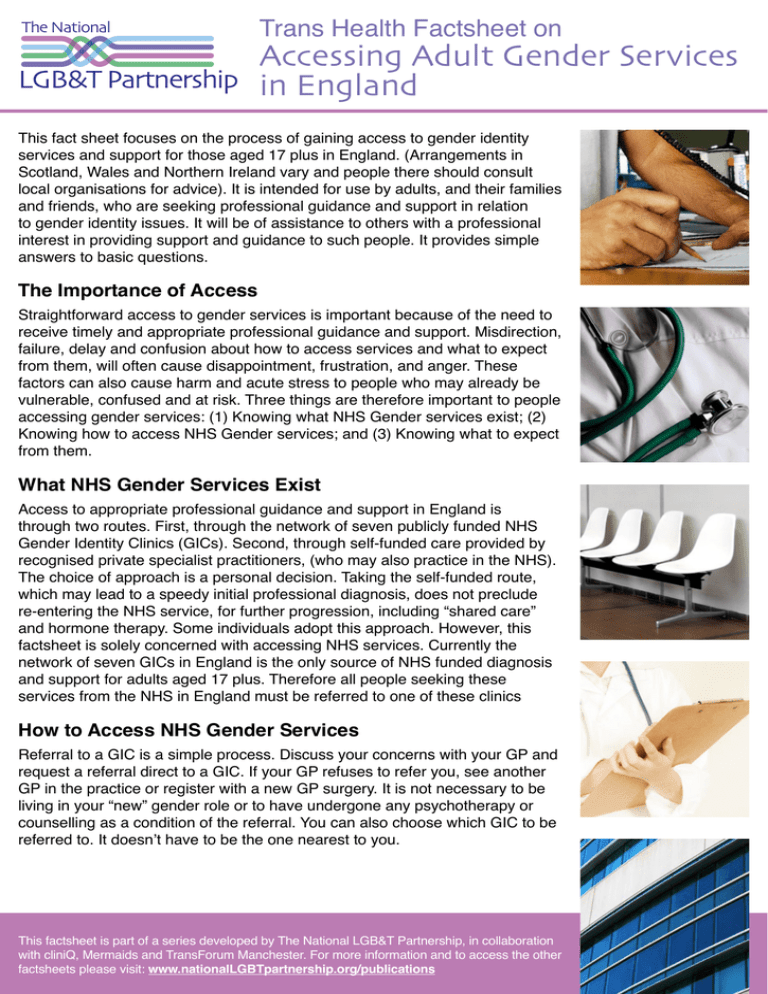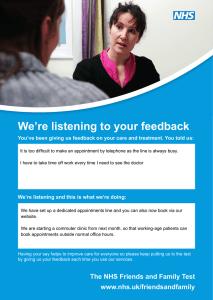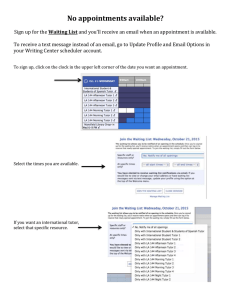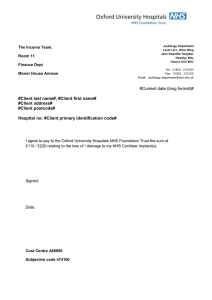Accessing Adult Gender Services in England LGB&T Partnership Trans Health Factsheet on
advertisement

The National Trans Health Factsheet on Accessing Adult Gender Services LGB&T Partnership in England This fact sheet focuses on the process of gaining access to gender identity services and support for those aged 17 plus in England. (Arrangements in Scotland, Wales and Northern Ireland vary and people there should consult local organisations for advice). It is intended for use by adults, and their families and friends, who are seeking professional guidance and support in relation to gender identity issues. It will be of assistance to others with a professional interest in providing support and guidance to such people. It provides simple answers to basic questions. The Importance of Access Straightforward access to gender services is important because of the need to receive timely and appropriate professional guidance and support. Misdirection, failure, delay and confusion about how to access services and what to expect from them, will often cause disappointment, frustration, and anger. These factors can also cause harm and acute stress to people who may already be vulnerable, confused and at risk. Three things are therefore important to people accessing gender services: (1) Knowing what NHS Gender services exist; (2) Knowing how to access NHS Gender services; and (3) Knowing what to expect from them. What NHS Gender Services Exist Access to appropriate professional guidance and support in England is through two routes. First, through the network of seven publicly funded NHS Gender Identity Clinics (GICs). Second, through self-funded care provided by recognised private specialist practitioners, (who may also practice in the NHS). The choice of approach is a personal decision. Taking the self-funded route, which may lead to a speedy initial professional diagnosis, does not preclude re-entering the NHS service, for further progression, including “shared care” and hormone therapy. Some individuals adopt this approach. However, this factsheet is solely concerned with accessing NHS services. Currently the network of seven GICs in England is the only source of NHS funded diagnosis and support for adults aged 17 plus. Therefore all people seeking these services from the NHS in England must be referred to one of these clinics How to Access NHS Gender Services Referral to a GIC is a simple process. Discuss your concerns with your GP and request a referral direct to a GIC. If your GP refuses to refer you, see another GP in the practice or register with a new GP surgery. It is not necessary to be living in your “new” gender role or to have undergone any psychotherapy or counselling as a condition of the referral. You can also choose which GIC to be referred to. It doesn’t have to be the one nearest to you. This factsheet is part of a series developed by The National LGB&T Partnership, in collaboration with cliniQ, Mermaids and TransForum Manchester. For more information and to access the other factsheets please visit: www.nationalLGBTpartnership.org/publications Trans Health Factsheet on Accessing Adult Gender Services in England What to Expect in Getting Your First Appointment Although the referral process is simple, demand for services is very heavy. Waiting lists for first appointments vary between the GICs and can be very long; and waiting times between follow up appointments can also be lengthy. Consequently some people experience frustration and disappointment when they do not receive an acknowledgement from the GIC in a reasonable time, with a date for their first appointment, or if appointments are cancelled or delayed at short notice. This can add to stress but it is not designed to “put people off”. It is simply a reflection of the fact that the service as it is currently resourced, organised and delivered, lacks the capacity to meet the increasing demand. What to Expect At Your First and Subsequent Appointments It is not necessary to attend your first appointment “dressed” and presenting in your “new” gender role. You will not be judged by your appearance or the extent to which it reflects your gender identity. It is not a test. You are attending for a personal and confidential consultation with an experienced professional about private issues, for which you wish to receive advice, help and support. At your first appointment you will have an opportunity to discuss your identity, any problems you are experiencing, and what help you would like. It can be rather liberating to discuss this with a trained professional, but can be rather daunting too, especially if it is for the first time. Bear in mind that the clinician is there to help you and don’t be afraid to ask any questions you may have. Some questions that the clinician may ask could feel rather personal so do ask for any support you need and remember there are no right or wrong answers. It will be important to tell your clinician if you have been taking hormones, whether from the private sector, the NHS, or if you have been ‘self-medicating’. After the first appointment you will be given an appointment to see a second Clinical Team Member, following which you may receive a professional opinion about whether or not you are experiencing “gender dysphoria”. However, in some cases, further appointments may be required. The next steps in the process will be agreed with you. These may include specialist counseling and, where relevant, establishing a Personalised Care Agreement (PCA), which will contain details of treatments and provisional timescales for progression. Each person’s journey is unique to them and may change over time; the PCA must be amended as necessary. Coping With The Process The process and the time it takes to receive a diagnosis and commence treatment, can be stressful due to delays, cancellations and requirements for further appointments and counselling. These can all seem like attempts to deter and test you but they are not. Consequently, it may cause some people stress, particularly where they are already suffering from difficulties with their family, at work, in their neighbourhood or are otherwise at risk. If this affects you, don’t hesitate to raise it with your GP or at the Clinic. It is very important that you talk about this with your clinician or another healthcare professional. Given the pressure of demand and the shortage of capacity, it is very important to attend the appointments offered to you. If you miss more than one appointment without giving notice, you may be discharged. Also make sure that you keep copies of all documentation including referral and appointment letters. You should keep in touch with the GIC to check on your progress. If you can attend at very short notice, you may be able to step in if someone else cancels an appointment. However, there will inevitably be ups and downs, so having support from trans groups and friends throughout the process is very important. The National LGB&T Partnership This factsheet is part of a series developed by The National LGB&T Partnership, in collaboration with cliniQ, Mermaids and TransForum Manchester. For more information and to access the other factsheets please visit: www.nationalLGBTpartnership.org/publications


